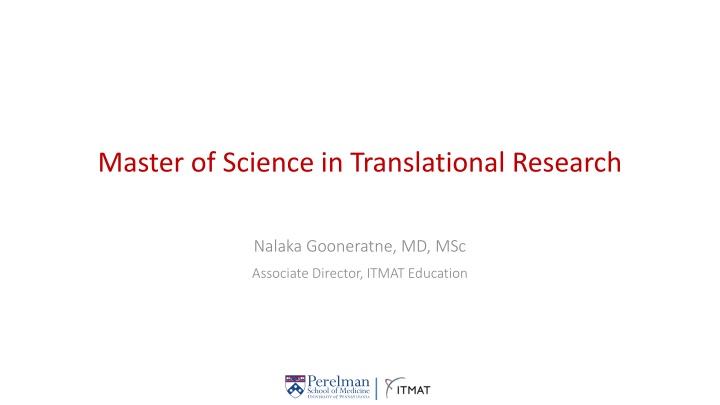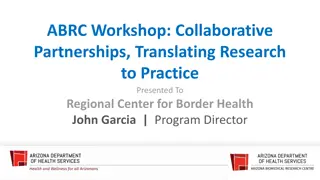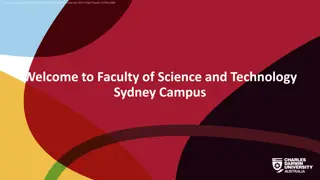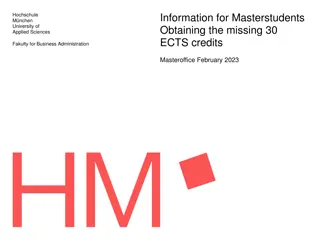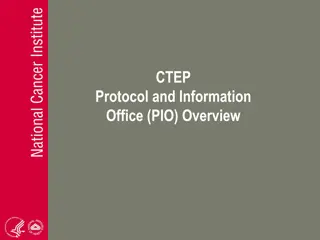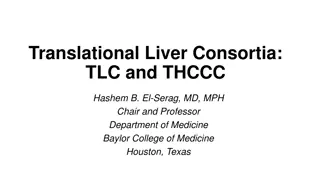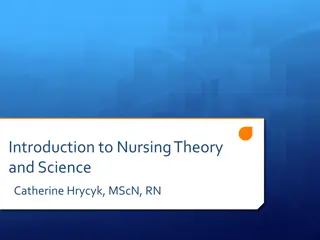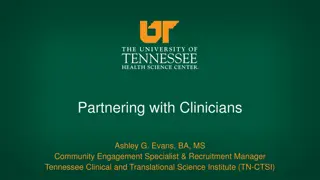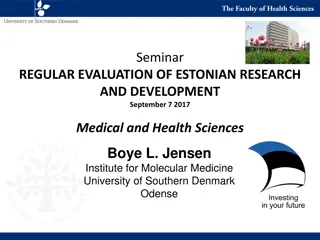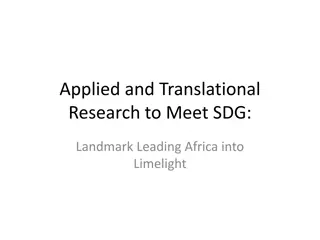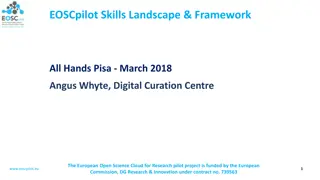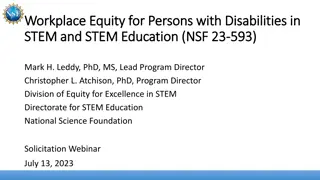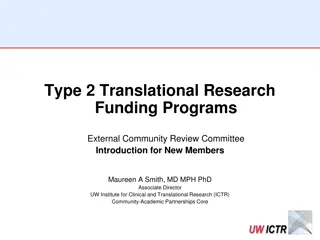Master of Science in Translational Research
The Master of Science in Translational Research program, led by Nalaka Gooneratne, MD, MSc, focuses on the shifting interface between academia and healthcare, emphasizing a learning health care system and the evolution of research landscape. This program aims to provide mentored training in translational research, combining didactic and experiential experiences to prepare trainees to think critically and answer research questions. The educational environment includes coursework, professional development, core mentoring, collaboration, advising, and funding opportunities. It offers concentrations in areas such as Discovery, Biomedical Informatics, Translational Therapeutics, and Regulatory Science.
Download Presentation

Please find below an Image/Link to download the presentation.
The content on the website is provided AS IS for your information and personal use only. It may not be sold, licensed, or shared on other websites without obtaining consent from the author.If you encounter any issues during the download, it is possible that the publisher has removed the file from their server.
You are allowed to download the files provided on this website for personal or commercial use, subject to the condition that they are used lawfully. All files are the property of their respective owners.
The content on the website is provided AS IS for your information and personal use only. It may not be sold, licensed, or shared on other websites without obtaining consent from the author.
E N D
Presentation Transcript
Master of Science in Translational Research Nalaka Gooneratne, MD, MSc Associate Director, ITMAT Education
The Shifting Interface of Academia and Healthcare Integrating the translation of discovery into medical education The Learning Health Care System Large Data Academic Partnerships/Consortia Team Science Science of Healthcare Economics Science of healthcare operations on outcomes
The Evolution of the Research Landscape Definition of Clinical Research Clinical Research Clinical Trials Observational Studies Pragmatic trials Proof of Concept Animals Proof of Concept Humans Basic Research + Translational Research Innovation + **The Learning Health Care System Health Sciences Policy + Health Systems Research
Overall Goals of MSTR Program Provide mentored training experience in translational research by combining didactic and experiential experiences in a structured degree granting program Prepare trainees to think critically to pose and answer research questions
Providing the Educational Environment Course work Professional Development Core Mentoring Ingredients for successful outcomes Collaboration Advising Resources Funding
General Information The program enrolls ~20 students per year Includes a mix of MD Students, Residents, Fellows, Pre/Postdoctoral Scientists, and early stage Faculty 10 funded (TL1) trainee slots for predoc students per year Students apply early in their 3rd year of Med School (Oct) Selection occurs in December Students start program at the end of their 3rd year (July)
MSTR Concentrations Discovery: For students who are elucidating the basic pathophysiological etiology and/or process of disease. Projects may be proof of concept in cell or animal models or human samples. Biomedical Informatics: For students who are adopting informatics methodologies to develop and test their own hypotheses. Discovery Translational Therapeutics and Regulatory Science Core Courses Biomedical Informatics TTRS: For students who are testing discoveries for preclinical and/or clinical effect. Projects may be first in humans, phase 1, or assessing the safety, efficacy, quality, and performance of regulated products. EntSci: For students who aim to navigate both business and academic environments as you conduct research and consider commercialization opportunities. Entrepreneurial Science
Overview of Curriculum 12 credits 6 Required Courses Biostats, scientific writing, measurement, protocol development, ethics 2 Elective Courses a mix of one credit and/or half credit courses 2 Lab Rotations Students learn 2 specific methods and are awarded 2 credits 2 credits for Thesis Students are awarded 2 credits for completing their thesis successfully
Research Project Written Thesis & Oral Defense Faculty Review & Presentation Project Execution Submit Final Proposal MTR 602 Peer Review Refine Proposal Initial Proposal Sept April-June Sept Spring 2021 July-Aug 2020-21 2020 2020 2020 2020
Professional Development Core (PDC) Career Pathways Negotiation Skills Leadership Professional Development Core Effective Communication Aligning Expectations Managing Up
Integration of Curricula Sample Study Plan YEAR FALL SPRING SUMMER Module 1 Module 2 1 Module 2 Module 4 Module 4 2 Module 4 Module 5 Step 1 USMLE MTR 601, 602 (Summer II) 3 Apply to program Research MTR 605, MTR 999 (Summer I) MTR 600, 603 MTR 604, Elective 1 4 Research Research Research MTR 999, Elective 2 Research Module 5 + 2 Thesis Credits Research 5
Clinical Rotations Permitted times: July and August after year one or spring of your final semester Summer I Term at the end of year one is required and the only term when MTR 605 Data Manuscript Writing is offered Year 1 Summer Session II Summer Session I Fall Spring MTR 601 MTR 602 MTR 600 MTR 603 MTR 604 Elective 1 MTR 605 MTR 999 Lab 1 Year 2 Summer Session II July/August Rotations Permitted Fall Spring Rotations permitted Thesis Defense (MTR 607/608) Elective 2 MTR 999 Lab 2
Finances YEAR 1 FALL SPRING SUMMER Module 1 MD tuition Module 2 MD tuition 2 Module 2 MD tuition Module 4 MD tuition Module 4 3 Module 4 MD tuition Module 5 MD tuition MTR tuition TL1 starts July 1st 4 MTR tuition TL1 grant MTR tuition TL1 grant MTR tuition TL1 ends June 30th 5 MTR tuition Module 5 + MTR MD tuition
Grant Funding & Tuition Costs Tuition Costs to student $60,576 (Total degree cost in FY 20) Subtract $20,500 (Tuition funds provided by appointment to the TL1 grant) Subtract $10,012 (PSOM additional course policy for 2 courses) This leaves $30,064 estimated out of pocket costs for MSTR tuition The out of pocket tuition cost is roughly equivalent to the one semester of MD tuition that is not charged during Fall of year 5. If you receive a PSOM scholarship it may not be used during the MSTR program, thus you are taking on an additional financial burden. Of note, all TL1 scholars receive a cost of living stipend of $24,816 for one year.
Current MD-MSTR Students Student Research Area Research Project Mentor A Mouse Model to Study Image-Guided, Radiation-Induced Cardiac Injury and Potential Clinically Targetable Biologic Mediators Alexandra Dreyfuss, BS Radiation Oncology Constantinos Koumenis, PhD Cardiovascular Surgery Proteomic analysis and hemodynamic assessment of endothelial progenitor and mesenchymal stem cell exosome therapy in a heart failure model Drew Goldberg, BA Pavan Atluri, MD Carissa Livingston, BS Cardiology Sunitinib-Induced Cardiotoxicity in an Engineered Cardiac Microtissue Model Kenneth Margulies, MD Manipulation of Pro-Hypertrophic Molecular Targets to Alter the Hypertrophic Cardiac Myocyte Response to Increased Stiffness Abhinay Ramachandran, BS Cardiology Kenneth Margulies, MD Characterization of functional immune response phenotypes at various stages of ocrelizumab therapy: predicting treatment response and disease activity Leah Zuroff, BA Neurology Amit Bar-Or, MD Evaluating topical bitter taste receptor agonists as novel therapies for chronic rhinosinusitis Alyssa Civantos, BA Otorhinolaryngology Noam Cohen, MD, PhD Sensitizing Glioblastoma to CAR-T Cell Therapy--Enzymatic Strategies for Overcoming Immune Evasion Donald O'Rourke, MD Roddy O'Connor, PhD Joseph Durgin, BA Immuno-oncology Ben Gu, BS, MS Neurosurgery Creation and Validation of a Layered Neural Tissue Construct for Cortical Repair Han-Chiao Isaac Chen, MD
MSTR Contact Information Emma A. Meagher, MD, Program Director emma@upenn.edu Nalaka Gooneratne, MD, MSc, Associate Director ngoonera@pennmedicine.upenn.edu Megan Maxwell, MSW, Associate Director mmaxwell@upenn.edu Visit website: http://www.itmat.upenn.edu/mstr/
Next Steps Reach out to ITMAT Ed to discuss your project and mentor selection, as well as program and funding logistics http://www.itmat.upenn.edu/ContactUs.html Identify primary mentor and project proposal prior to application Plan to submit your application in Fall of Year 3
ITMAT MS1 Summer Internship Opportunity Seven week funded summer internship to Penn MS1 students interested in engaging in translational research 1-2 qualified candidates each year will each receive a $3000 stipend Apply by February 1, 2020 for Summer 2020 Selected candidates will be notified by March 1 More information here: http://www.itmat.upenn.edu/MS1Internship.html
